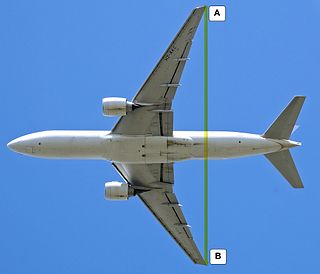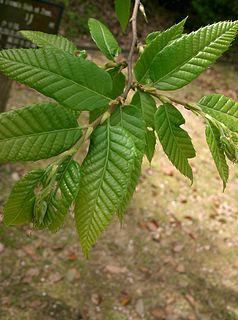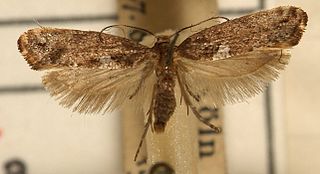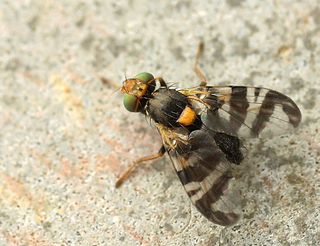| Ukamenia sapporensis | |
|---|---|
| Scientific classification | |
| Kingdom: | Animalia |
| Phylum: | Arthropoda |
| Class: | Insecta |
| Order: | Lepidoptera |
| Family: | Tortricidae |
| Genus: | Ukamenia |
| Species: | U. sapporensis |
| Binomial name | |
| Ukamenia sapporensis (Matsumura, 1931) | |
| Synonyms | |
| |
Ukamenia sapporensis is a moth in the Tortricidae family. It was described by Matsumura in 1931. It is found in Japan [1] (Hokkaido, Honshu) and the Russian Far East.

Moths comprise a group of insects related to butterflies, belonging to the order Lepidoptera. Most lepidopterans are moths, and there are thought to be approximately 160,000 species of moth, many of which have yet to be described. Most species of moth are nocturnal, but there are also crepuscular and diurnal species.

The Tortricidae are a family of moths, commonly known as tortrix moths or leafroller moths, in the order Lepidoptera. This large family has over 10,350 species described, and is the sole member of the superfamily Tortricoidea, although the genus Heliocosma is sometimes placed within this superfamily. Many of these are economically important pests. Olethreutidae is a junior synonym. The typical resting posture is with the wings folded back, producing a rather rounded profile.

Japan is an island country in East Asia. Located in the Pacific Ocean, it lies off the eastern coast of the Asian continent and stretches from the Sea of Okhotsk in the north to the East China Sea and the Philippine Sea in the south.
The wingspan is 10.5-14.5 mm. The ground colour of the forewings is dark grey with a rosy-red costal patch, a bluish metallic mark, a series of metallic spots and ochreous-brown streaks. The hindwings are brownish grey.

The wingspan of a bird or an airplane is the distance from one wingtip to the other wingtip. For example, the Boeing 777-200 has a wingspan of 60.93 metres, and a wandering albatross caught in 1965 had a wingspan of 3.63 metres, the official record for a living bird. The term wingspan, more technically extent, is also used for other winged animals such as pterosaurs, bats, insects, etc., and other fixed-wing aircraft such as ornithopters. In humans, the term wingspan also refers to the arm span, which is distance between the length from one end of an individual's arms to the other when raised parallel to the ground at shoulder height at a 90º angle. Former professional basketball player Manute Bol stands at 7 ft 7 in (2.31 m) and owns one of the largest wingspans at 8 ft 6 in (2.59 m).
Larvae have been recorded feeding on Hamamelis japonica , Vaccinium oldhami , Quercus mongolica and Castanea crenata . [2]

Hamamelis japonica, Japanese witch-hazel, is a species of flowering plant in the family Hamamelidaceae, native to Japan but widely cultivated in temperate situations elsewhere. A horizontally spreading, hardy deciduous shrub or small tree, it is notable for the slightly fragrant yellow blooms which clothe its naked branches in the depths of winter through to early spring. The green leaves follow, and in favourable locations they turn yellow before dropping in autumn.

Quercus mongolica, commonly known as Mongolian oak, is a species of oak native to Japan, southern Kuriles, Sakhalin, Manchuria, central and northern China, Korea, eastern Mongolia, and eastern Siberia. The species can grow to be 30 m tall.

Castanea crenata, known as Korean chestnut, Korean castanea, and Japanese chestnut, is a species of chestnut originally native to Japan and South Korea. It is a small to medium-sized deciduous tree growing to 10–15 m tall. The leaves are similar to those of the sweet chestnut, though usually a little smaller, 8–19 cm long and 3–5 cm broad. The flowers of both sexes are borne in 7–20 cm long, upright catkins, the male flowers in the upper part and female flowers in the lower part. They appear in summer, and by autumn, the female flowers develop into spiny cupules containing 3–7 brownish nuts that are shed during October.








